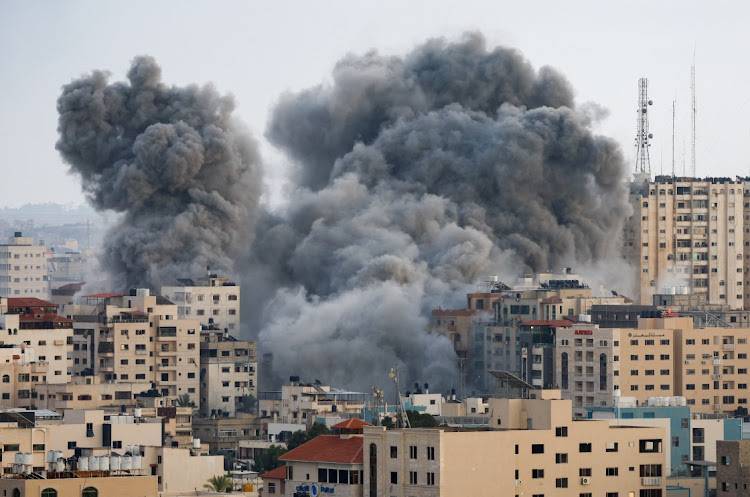United Nations (Agencies): Fierce Israeli attacks continue raining death and destruction across Gaza from the air, sea, and on the ground, the UN’s top humanitarian official told Member States on Friday, reporting that 41,000 houses have now been destroyed or severely damaged.
More than 1.5 million Gazans are displaced, 18 hospitals have shut down, and hundreds of thousands are living in fear and under continuing Israeli bombardment, the Emergency Relief Coordinator and Humanitarian Affairs chief, Martin Griffiths, told an informal meeting of the UN General Assembly on the situation in ravaged Gaza.
“Casualties continue to mount, with the dead reportedly exceeding 11,000 people – the majority of them children and women,” he said.
“The actual total, however, is likely much higher as figures have not been updated for five days due to a collapse of communication networks in Gaza,” Griffiths added.He further stated that across Gaza, but particularly in the north, food and water supplies are running perilously low, and the lack of fuel means communications and essential services like water desalination are progressively failing.
In this regard, Griffiths reiterated the UN’s 10-point plan setting out the necessary requirements for an effective humanitarian response.
He called on UN Member States to help achieve these objectives.
Natalie Boucly, Acting Deputy Commissioner-General for the UN agency assisting Palestine refugees, UNRWA, said that no part of the Gaza Strip has been spared from the bombardment.
“Hospitals, mosques, churches, bakeries, and over 60 UNRWA buildings and schools have been hit across Gaza,” she said.
Most of the agency’s impacted facilities were in the middle areas and in the south, Ms. Boucly added, noting that this was where people were told to go for safety.
“They came to UNRWA buildings to be protected by the UN flag,” she said.
The UNRWA official stressed that the work of the agency has become “mission impossible”.
“We cannot fully protect people in UN premises, under the UN flag. We cannot reach people in need, including thousands still trapped in the north. We cannot provide sufficient assistance to those we can reach,” she said.
UNRWA’s fuel stocks are almost depleted, with massive implications for the civilian population, including its 13,000 staff.
Concluding her briefing, Ms Boucly said that there is a collective responsibility on the part of the international community to ensure that the war ends now.
Volker Turk, UN High Commissioner for Human Rights (OHCHR), voiced deep concern over the growing risk of spillover into the wider Middle East region, if the fighting continues.
He also emphasized that the crisis posed another global shock to the multilateral system “driving more polarization and creating deeper fractures, with terrible impact on the solutions that humanity so urgently needs.”
Turk underscored that these resolutions must not be ignored by Israel or Palestinian militants in the Gaza Strip.
The UN rights chief also warned against rising hate speech and disinformation, which is fueling dehumanization and thwarting the search for an enduring political solution.
“I am very concerned about the risk of further grave violations, even potentially amounting to atrocity crimes, in light of recent statements by some in leadership positions,” he said.
Tedros Adhanom Ghebreyesus, Director-General of the UN World Health Organization (WHO), informed Member States that it is becoming harder to evaluate the functioning of the health system in Gaza.
“What is clear is that the health needs of the people of Gaza are growing all the time, and the health system is near collapse,” he said.
Only 10 of Gaza’s 36 hospitals are still functioning, with just 1,400 hospital beds, and many health workers have been displaced, forced to flee with their families.
“Here’s what that means: more and more casualties, and fewer and fewer beds, health workers, medicines and supplies,” said Tedros, adding that there are rising cases of respiratory and skin infections, and acute watery diarrhoea due to lack of sanitation.
The head of WHO called for the immediate implementation of the Security Council resolution adopted on Wednesday, and for the parties to abide by it.
Achim Steiner, Administrator of the UN Development Programme (UNDP), told Member States that the almost six weeks of war have created a crisis of massive scale.
He presented findings from UNDP’s latest assessment, which projected that if the fighting continues for a second full month, poverty could soar by 34 per cent, pushing half a million additional people into poverty.
“A third full month of war would see poverty increase by almost 45 per cent, expanding poverty to include over 39 per cent of the population for a total of more than 2.1 million people,” he said.
He also informed Member States of the impacts on the Palestinian economy, with the GDP declining by an estimated 4.3 per cent, sustaining a loss of over $857 million.
“With a third full month of war, the decrease of GDP would reach 12.2 percent, with losses of over $2.5 billion,” he said.
The UNDP head said that even with the most conservative scenario, it is estimated that the war will set back development in the State of Palestine by 11 years, with Gaza suffering a setback of 17 years. Under higher impact scenarios, the impact in Gaza would rise to 19 years and in the State of Palestine as a whole by 16 years, he said.
“Every additional month that this war continues will come with huge and compounding cost to all Palestinians now and in the medium term,” he said, underscoring the need to step up efforts to stop the war, “as a humanitarian but also as a development imperative.”


